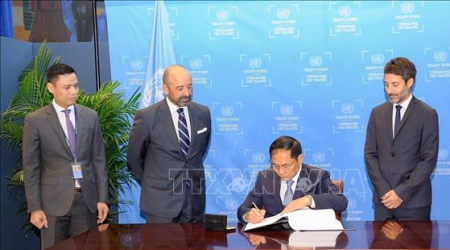Vietnam signs the agreement on conservation and sustainable use of marine biodiversity
On 20th September, 2023 in New York, USA, within the framework of the High-Level Week of the 78th session of the United Nations General Assembly (UNGA), together with more than 60 other countries, Vietnam signed the Agreement on “Conservation and sustainable use of biological diversity in waters beyond national jurisdiction” (the High Seas Treaty). This is the third agreement implementing the 1982 United Nations Convention on the Law of the Sea (UNCLOS) and is a historically significant event that reaffirms the role and importance of the Convention as a legal framework for all activities on seas and oceans.
 |
| Minister of Foreign Affairs Bui Thanh Son signs the Agreement at the UN Headquarters in New York |
The signing of the Agreement with a high percentage of votes resulted from a long-term effort of the international community during nearly two decades with official negotiations beginning in 2018, attracting the participation of most United Nations member countries, including landlocked countries or non-members of the UNCLOS. It can be affirmed that this is a historical milestone in the international community’s effort in protecting marine environment, during the implementation of the 2030 Agenda, especially the sustainable development goal No. 14 on conservation and sustainable use of the oceans and marine resources. According to scientists, as soon as the Agreement takes effect, it will regulate the exploitation, benefit sharing and conservation of marine genetic resources in international waters (currently accounting for more than 60% surface area of the oceans), aiming at sustainable development, while promptly addressing threats to the oceans. On the other hand, the above event is even more important as at present, only developed countries and private companies with leading marine technologies and biotechnologies and abundant financial resources, are capable of collecting marine genetic resources and developing profitable applications, while there is no international document regulating the obligation to share benefits and conserve these resources. After signing, countries need to conduct ratification and approval procedures to officially become members of the Agreement.
As a coastal state, Vietnam participated in the negotiation process from the beginning and was one of the first countries to sign the Agreement. This sends a strong message that Vietnam is an active and responsible member of the international community, joining hands with countries around the world to solve global problems, contributing to peace, prosperity and sustainable development. The agreement opens up opportunities for Vietnam and other developing countries to participate in scientific research, marine technology transfer, and benefit economically from other countries with greater advantages. This is completely consistent with the "Strategy for sustainable development of Vietnam's marine economy to 2030, vision to 2045", especially our Party's breakthrough views and orientations on scientific and technological development and training of high-quality marine human resources, to realise the goal of making Vietnam a strong maritime nation with sustainable development, prosperity, security and safety. Moreover, the Agreement also creates and encourages international cooperation mechanisms and regional marine cooperation with the goal of preserving and sharing benefits from marine genetic resources, ensuring sustainable development and green growth, preserved marine biodiversity and the close combination between economic development with national defence and security strengthening for protecting the Fatherland "early and from afar".
CAO VUONG